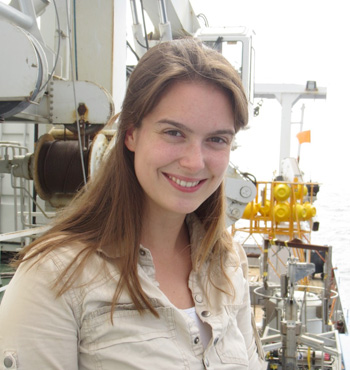iAtlantic: Assessing the impact of multiple environmental stressors on Atlantic Ocean deep-sea ecosystems
Climate change stressors will also impact soft sediment ecosystems in the deep sea, but it is unclear how and what the effects on wider ecosystem function. I look at how climate stressors may impact deep soft sediments from a multiple of angles:
1) I look at C cycling at eutrophic and oligotrophic abyssal sites using a linear inverse food-web model quantified with published data. How does C cycling through the abyssal food web at the Porcupine Abyssal Plain (which is considered eutrophic i.e. relatively food rich) differ from the oligotrophic (i.e. relatively food poor) ocean gyre near Cabo Verde? Initial results show organisms have different contributions to C processing, meaning that a change in POM flux due to climate stressor will likely shift functioning of different organismal groups in the sediment. I hope to also be able to model stressors on these baseline models.
2) A stable isotope tracer experiment in the Cabo Verde abyssal basin was conducted in situ using a seafloor lander. The data tells us baseline functioning in this area: respiration rates, nutrient cycling, and relative importance of various organismal groups. It is the second study in the Atlantic Ocean to comprehensively look at functioning and specifically C cycling in multiple levels of the food-web from bacteria to macrofauna. The other study in the Atlantic was conducted at the Porcupine Abyssal plain, so results can be used in a space-for-time comparison, to infer how changing POM flux (which differs between studied sites) may impact ecosystem functioning in future climates.
3) Slope sediments from the Cabo Verde bathyal zone were exposed to stressors in shipboard incubations, and the response to the stressors measured using a stable isotope tracer experiment. We stressed the sediments with higher temperatures, reduced food quality, and both increased temperatures and reduced food quality. Initial results show temperature mainly impacts oxygen consumption rates, whereas food quality mainly impacts C processing by the organisms. The results will be studied for interactions between the stressors, and initial conclusions do suggest reduced C storage capability of deep sediments in future climates.
4) A baited camera seafloor lander was deployed at the Cabo Verde abyssal basin to study the scavenging activity of demersal scavengers (mostly fish, amphipods, and decapods) on either squid or fish bait. In changing climates, the composition of pelagic communities is shifting with one example being an increase in squid populations while fish populations are decreasing. Initial results show a significantly different scavenging reaction at squid bait compared to fish bait, with higher consumption rates, a different community composition and different successional dynamics at the squid bait. These initial results imply the composition of demersal scavengers might be altered with changing food-fall compositions, as scavenging species react different to bait types for example due to swimming speed and ability to detect the odour plume.
Supervisors
Prof. Bhavani Narayanaswamy (SAMS) Assoc.
Funder
EU Horizon 2020
University
University of the Highlands and Islands
Career
July 2020 – April 2023 - PhD researcher, Heriot-Watt University
Nov 2019 – June 2020 - Junior Researcher, NIOZ Royal Netherlands Institute for Sea Research
Higher Education
2019 - MSc summa cum laude, Marine Biology - University of Groningen
2016 - BSc cum laude, Biology - University of Groningen
Barnhill, K. A., Vinha, B., Smith, A. J., Jonge, D. S. W. de, Gaurisas, D. Y., Segura, R. M., Madureira, P., Albuquerque, M., Huvenne, V. A. I., Orejas, C.,; Gunn, V. (2023). Ship-to-Shore Training for Active Deep-Sea Capacity Development. BioRxiv, 2023.03.11.531674. https://doi.org/10.1101/2023.03.11.531674
Visser, F., Merten, V. J., Bayer, T., Oudejans, M. G., de Jonge, D. S. W., Puebla, O., Reusch, T. B. H., Fuss, J., & Hoving, H. J. T. (2021). Deep-sea predator niche segregation revealed by combined cetacean biologging and eDNA analysis of cephalopod prey. Science Advances, 7(14), 1–12. https://doi.org/10.1126/sciadv.abf5908
de Jonge, D. S. W., Merten, V., Bayer, T., Puebla, O., Reusch, T. B. H., & Hoving, H. J. T. (2021). A novel metabarcoding primer pair for environmental DNA analysis of Cephalopoda (Mollusca) targeting the nuclear 18S rRNA region. Royal Society Open Science, 8(2). https://doi.org/10.1098/rsos.201388
de Jonge, D. S. W., Stratmann, T., Lins, L., Vanreusel, A., Purser, A., Marcon, Y., Rodrigues, C. F., Esquete, P., Cunha, M. R., Breugel, P. van, Sweetman, A. K., Soetaert, K., & Oevelen, D. van. (2020). Abyssal food-web model indicates faunal carbon flow recovery and impaired microbial loop 26 years after a sediment disturbance experiment. Progress in Oceanography. https://doi.org/https://doi.org/10.1016/j.pocean.2020.102446
Schoening, T.; Durden, J.M.; Preuß, I.; Branzan Albu, A.; Purser, A.; De Smet, B.; Dominguez-Carrió, C.; Du Preez, C.; Yesson, C.; de Jonge, D.S.W.; Lindsay, D.; Rybakova Goroslavskaya), E.; Schulz, J.; Ove Möller, K.; Beisiegel, K.; Picheral, M.; Piechaud, N.; Galkin, S.; Sharuga, S.; Treibitz, T.; Kwasnitschka, T. Report on the Marine Imaging Workshop 2017. Research Ideas and Outcomes 3: e13820 (06 Jun 2017) https://doi.org/10.3897/rio.3.e13820
